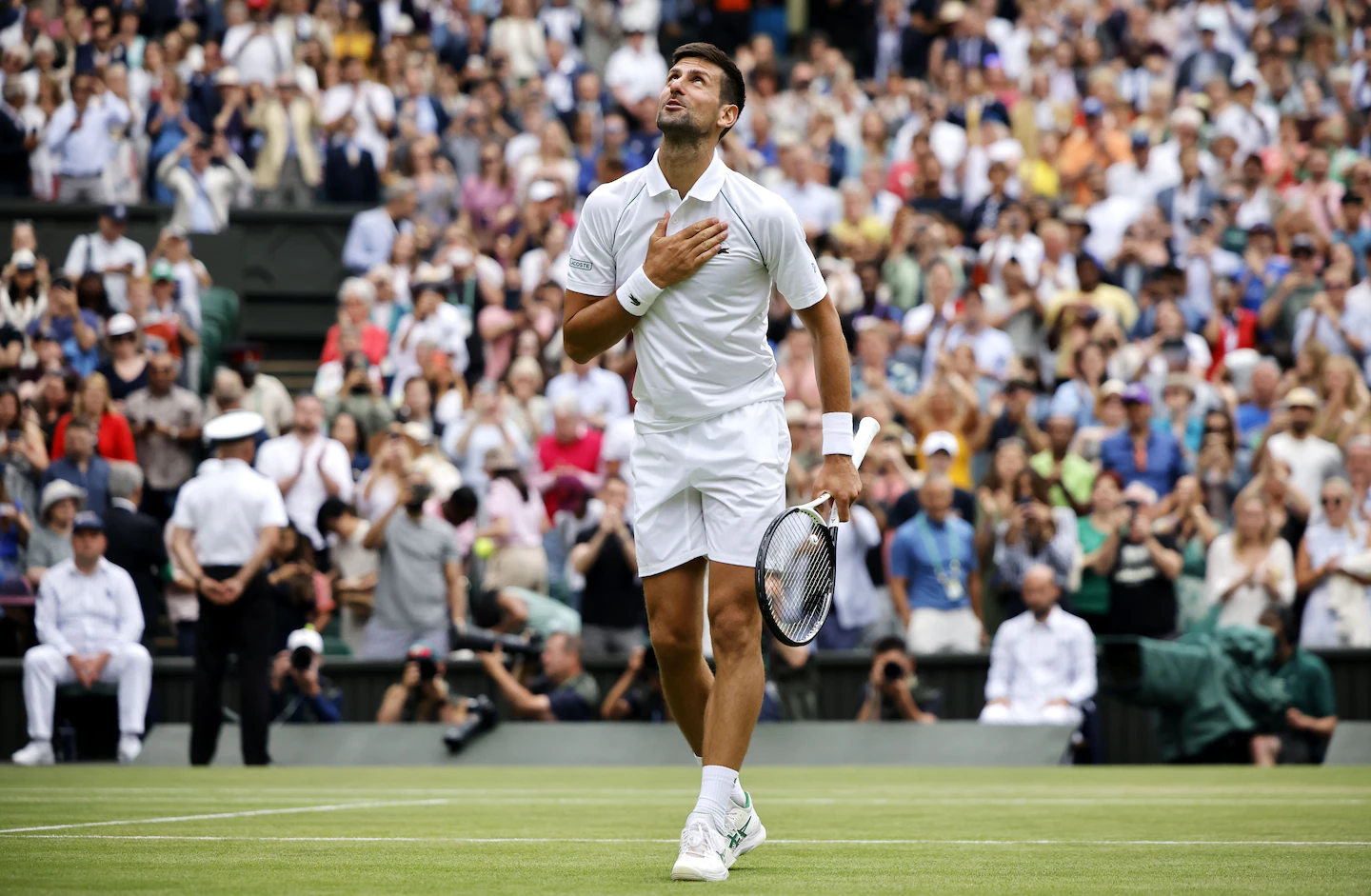On Tuesday at Wimbledon, she saw something right up there alongside any of that: the towering will and absurd level six-time champion Novak Djokovic has found for himself, all wrapped in one five-set match Djokovic trailed by two sets against a blast of a phenom.
So an unsurpassed venue saw more unmistakable greatness. What gluttony.
If Djokovic’s 5-7, 2-6, 6-3, 6-2, 6-2 win over 20-year-old Italian Jannik Sinner doesn’t prove memorable to the Centre Court patrons who saw it and tried to urge on Sinner, it might be because they popped the extra cork or two, a sound Centre Court has embraced in recent years. If the passing shot Djokovic struck late in the fifth set doesn’t stand out in memory because of excessive Pimm’s or whatever, well, there’s always YouTube, where it belongs in perpetuity.
To the rational, it might remain baffling how anybody could dig out of how things looked for Djokovic on Centre Court by midafternoon. Djokovic described what everyone saw: “I started doubting my shots. He started believing in himself more. He had just a better, I guess, mentality on the court. I was not staying in the rallies. He had confidence to step in and dictate the play. I was not staying in the rails. I was missing, I was too passive, and it happens, you know, on this level that, particularly on grass, everything happens very fast.”
What followed was the work of the great, even if it did require a trip to the bathroom and a look in the mirror and a talk with the face therein. The 17 years Djokovic has spent in five-set Grand Slam matches all seemed visible in how the 35-year-old suddenly located a level of tennis rare enough that it might be rarest.
He has played a good-grief 43 five-set matches in the four most coveted events. He has won 34 of those. He has won 16 of his past 18. He has won against Federer in the 2019 final here when Djokovic’s unforced errors in the three tiebreakers he won wound up coming in at zero. He has won them going back to 2005 — Wimbledon, second round, Guillermo Garcia-Lopez — and he has won them seven times from the two-set hole: against Garcia-Lopez then, Federer at the 2011 U.S. Open, Andreas Seppi at the 2012 French Open, Kevin Anderson at Wimbledon 2015, Lorenzo Musetti and Stefanos Tsitsipas at the 2021 French Open and Sinner on Tuesday. His opponent had gone 2-2 in four before Tuesday, not bad for a pup.
Yet it was when Djokovic brought the level into the clouds — three unforced errors in the third set, eight in the fourth, three in the fifth — that both players began to notice the U-turn. For that, they would look back to the same game without consulting each other: the fourth game of the third set, when Djokovic broke at love for 3-1. Sinner would lament his “easy forehand into the net” that made things love-30 and helped build the snowball. Djokovic would tell both the crowd in the post-match interview and the reporters in the interview room that he felt “confidence” there while noticing in Sinner a smidgen of “doubt.”
He could feel things from the other side of the court — and not just when he clambered over the net in the fourth set to help up Sinner after the lad twisted his ankle and spilled in brief agony. Amid multiple praises for Sinner as “fantastic,” “very mentally present,” “devoted” and “professional,” Djokovic said: “I feel like Sinner, you know, coming into the match didn’t have much to lose, but he had a lot to lose when he was two-sets-to-love up. I could feel that mentally with him.”
That’s the otherworldly level of feel from one who has played these fracases for 17 years and who said, “You approach these particular situations when you’re two sets down a bit more calmly, a bit more confident, with more self-belief, if that could be a definition of it.” He said: “These things play a role. How big of a role, that really is dependent on both players.” And he said: “From the start of the third, I played three really solid, very high-quality tennis sets. From the very beginning of the third when I broke his serve early, I felt that I found my rhythm and tempo on the shots.”
He said, “I kind of played a new match, to be honest,” even as Sinner said fairly, “The fifth set, I think I played in the right way.”
That fifth set had Sinner hitting a groaning drop shot that fluttered like a dying mosquito into the net at the tired end of a 12-shot rally. That point gave Djokovic a valuable service break for 2-1. Then as Sinner served at 2-4 with the afternoon getting bluer but the stage lights about to dim, the point at 30-30 brought the point of runaway mastery.
Three shots into the rally, Sinner drove Djokovic into the backhand corner and took his lanky self and his powerful shots to the net. Djokovic went over there to drag out the thing and splayed into near-splits, lunged over and redirected the ball back across the court and past Sinner. The crowd did marvel regardless of anything else, and Djokovic remained on his chest making an airplane form or, as one wag put it, “more seaplane.”
Then he got up and did his old tongue-in-cheek ritual of begging for applause.
It was a gasp of a point by a gasp of a player, so it’s no wonder that on the next one, on break point, Sinner went to a sitter and mis-hit it so far long it looked nightmarish. It looked like he knew he would have to do something perfect.
Then Djokovic won again, an 84th singles victory at Wimbledon since starting in 2005, and he told the crowd about the “pep talk in the mirror,” then said of that, “It’s actually true.” Everyone laughed, and he spoke of having to “recuperate and, I guess, regather the thoughts and reassemble,” and he said, “The inner fight is always the biggest fight that you have to go through on the court.”
The same goes for life, of course, but here he had won another inner fight, and it had been something else — and, somehow, Centre Court had seen that, too.


